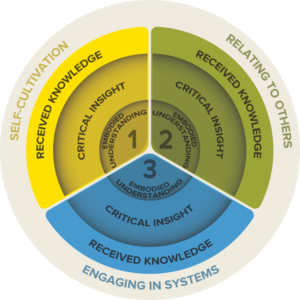Compassionate Integrity Training (CIT) is a multi-part training program that cultivates basic human values as skills for the purpose of increasing individual, social and environmental flourishing. By covering a range of skills from self-regulation and self-compassion to compassion for others and engagement with complex systems, CIT focuses on and builds towards compassionate integrity: the ability to live one’s life in accordance with one’s values with a recognition of common humanity, our basic orientation to kindness, and reciprocity. Unlike some definitions of integrity that focus on mere consistency with one’s values, without examining what those values are, compassionate integrity insists that consistency with one’s values is not enough if those values promote harm to oneself, others, or the world. Instead, maintaining and increasing consistency with one’s values is most beneficial when they are values that promote one’s own well-being as well as that of others. As to what those values are and how we understand them, this is arrived at by investigating and examining things for oneself, using common sense, common experience, and science. Compassionate integrity is, therefore, not something achieved merely as a result of wishful thinking or force of will, but rather as the result of building up knowledge, understanding, and a set of concrete skills. Because compassionate integrity is what guards against actions that compromise the well-being of oneself and others, cultivating it in one’s life and in one’s community directly impacts individual and collective flourishing.


